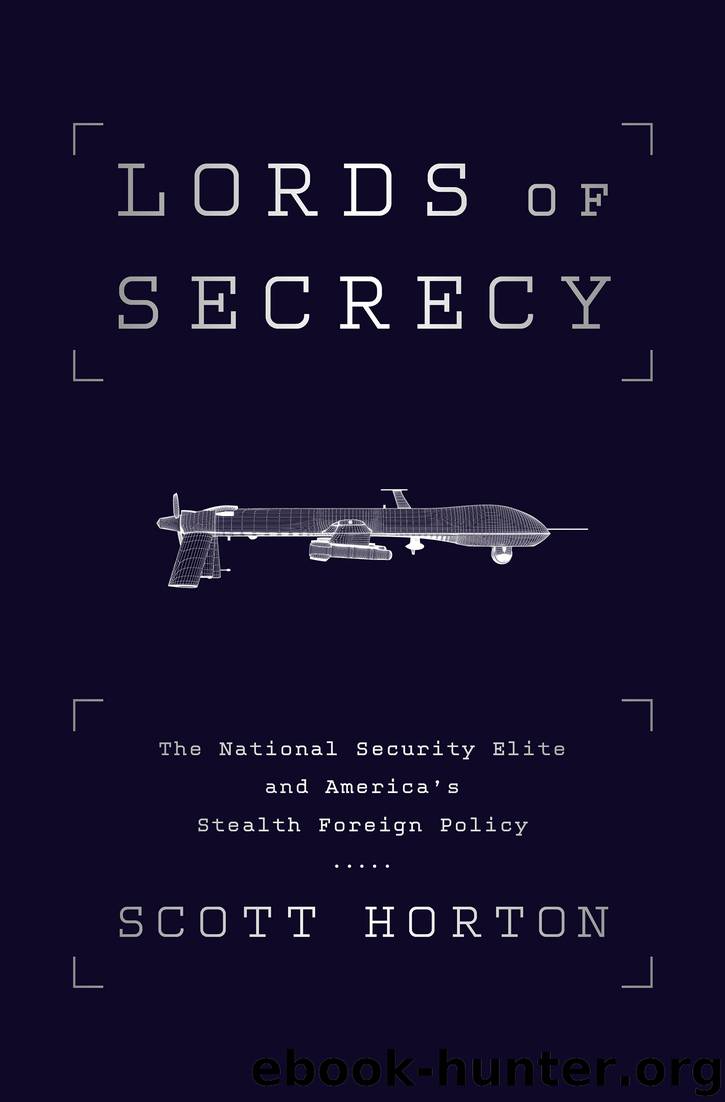Lords of Secrecy by Scott Horton

Author:Scott Horton
Language: ara
Format: epub
Publisher: Nation Books
Published: 2014-10-22T16:00:00+00:00
—MAXIM FOR NEWSPAPER EDITORS1
THE AMERICAN INTELLIGENCE COMMUNITY has been rocked twice in recent years by unauthorized disclosures of sensitive information that are historically unprecedented in scope. The first came with the publication by WikiLeaks—a nonprofit organization dedicated to the publication of classified or secret information by anonymous sources—beginning in February 2010 of a large cache of classified State Department cable traffic, which had apparently been leaked by an American noncommissioned officer with authorized access.
The second wave struck in June 2013, when former NSA contractor Edward Snowden supplied an immense number of NSA documents—including internal briefing memorandums showing how the NSA explained its own operations to its staff—to major western media organizations. The US government first argued that these leaks dangerously undermined national security and placed American service personnel and those supporting them at risk. Under challenge, however, US government officials were forced to step back from many of these claims.2
The American intelligence community was undeniably injured with its own public, which quickly learned that intelligence community representatives had long made highly misleading or outright false statements on how surveillance activities affected them. The disclosures also embarrassed key defenders of the NSA, including the two congressional intelligence chairs—Sen. Dianne Feinstein and Rep. Mike Rogers—by demonstrating that they lacked a firm understanding of the NSA programs. Most damaging were the NSA’s own internal briefing slides, which contained frank appraisals and explanations of NSA programs that often directly contradicted what NSA leaders had given to the public and to Congress, and that congressional leaders had then parroted.3 These developments point to the critical significance of unauthorized leaks as a trigger to democratic debate about secrecy, and raise questions about the legitimacy and fairness of government measures taken to grapple with the leakers.
For Weber, there was one obvious way to shield democracy from a bureaucracy armed with secrecy: parliamentary inquiry. It could be wielded aggressively to uncover corruption, ineptitude, and criminality that bureaucrats would inevitably try to cover up. But for Weber’s American disciples, who had deeper experience with the practical working of legislatures as well as a more practical sense of their shortcomings, this reliance on a single institution seemed naive.
Daniel Patrick Moynihan and Edward Shils appreciated that legislative inquiry can be an effective check only to the extent that other institutions, such as the press and the courts, supported it by allowing a vital flow of information that the lords of secrecy would not willingly release to the public sector. During and immediately after World War II, the US Congress exercised rigorous checks over military spending and intelligence activities. But in an electoral system dominated by the need for large quantities of cash to fuel campaigns, Congress was increasingly held captive by campaign funders. Oversight of the intelligence sector was particularly vulnerable. Its activities were largely in the shadows and thus removed from the realm of public political discourse.
Over time, intelligence came to focus less on traditional spycraft and more on technological innovations that facilitated surveillance on a scale and over an area previously unimaginable.
Download
This site does not store any files on its server. We only index and link to content provided by other sites. Please contact the content providers to delete copyright contents if any and email us, we'll remove relevant links or contents immediately.
| Anthropology | Archaeology |
| Philosophy | Politics & Government |
| Social Sciences | Sociology |
| Women's Studies |
The Secret History by Donna Tartt(19086)
The Social Justice Warrior Handbook by Lisa De Pasquale(12190)
Thirteen Reasons Why by Jay Asher(8909)
This Is How You Lose Her by Junot Diaz(6886)
Weapons of Math Destruction by Cathy O'Neil(6279)
Zero to One by Peter Thiel(5801)
Beartown by Fredrik Backman(5754)
The Myth of the Strong Leader by Archie Brown(5507)
The Fire Next Time by James Baldwin(5442)
How Democracies Die by Steven Levitsky & Daniel Ziblatt(5218)
Promise Me, Dad by Joe Biden(5153)
Stone's Rules by Roger Stone(5087)
A Higher Loyalty: Truth, Lies, and Leadership by James Comey(4962)
100 Deadly Skills by Clint Emerson(4925)
Rise and Kill First by Ronen Bergman(4788)
Secrecy World by Jake Bernstein(4753)
The David Icke Guide to the Global Conspiracy (and how to end it) by David Icke(4717)
The Farm by Tom Rob Smith(4507)
The Doomsday Machine by Daniel Ellsberg(4490)
